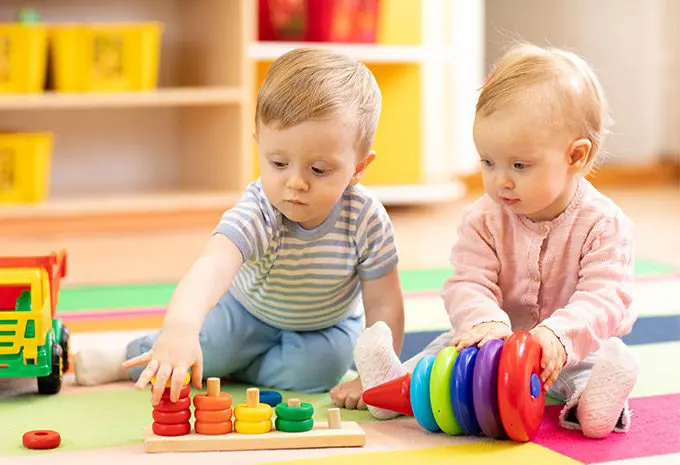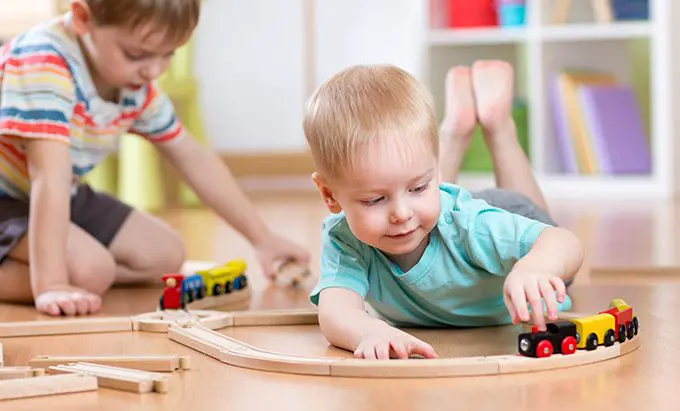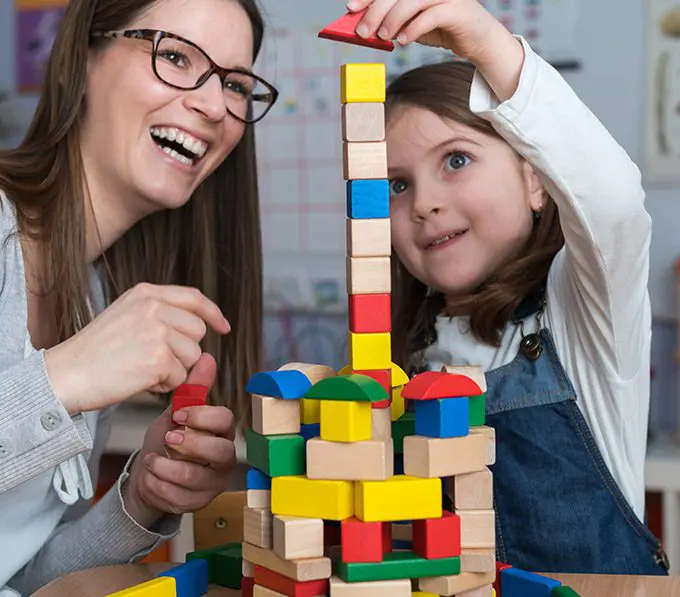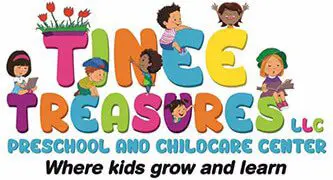
Early Childhood Education Programs
Infant Childcare (6 weeks – 14 months) Fairview Heights, IL
- Embracing and welcoming classroom environments
- Stimulating activities and toys designed for learning
- A milestone-based curriculum
- Immersive learning experiences
In our classrooms, your infant will receive personal and individualized attention and care. Our stimulating environment helps form a foundation for learning with three focus areas:

- Reading/Cozy Area: This is where reading will take place, storytelling, and conversations.
- Exploration/Adventure Area: Where your infant will be able to interact with objects and materials and learn to manipulate their environment.
- Movement Area: Where they can explore their balance and coordination, working on their gross motor skills.
Curriculum and Developmental Scales
Our early childhood education curriculum is designed to meet the specific developmental needs of this age group and is geared towards growing five developmental areas.
- Approaches to Learning – This focuses on their ability to solve problems and lets them become more independent by exploring the world around them.
- Cognitive Development – Strengthens their ability to think critically and creatively to help understand their environment.
- Language Development – The ability to effectively use sounds, expressions, body language, oral, and written language to communicate, understand and respond to others.
- Physical Development – Work on their large and small muscle movements which helps build awareness of health and safety.
- Social-Emotional Development – Increases their awareness of themselves and their own emotions which helps them interact with others; helps your child understand relationships with others like family and friends.
Toddler Childcare (15 months – 23 months)
A natural part of your toddler’s growth and learning stems from energy and enthusiasm. We focus on channeling that energy and transforming it into positive learning experiences, allowing your toddler to explore the world around them. We greet them with positive reinforcement as they build their physical skills and master developing achievements. In this early childhood education program, children are provided with:
- Stimulating classroom environments
- A milestone-based curriculum
- Immersive learning practices
- Toys and activities designed for education
During the toddler stage, your child tends to be more mobile, therefore, our classroom is designed to allow opportunities for exploration through a variety of learning practices.

- Movement Center: In order to help build your child’s gross motor skills, balance and coordination; this area will be used to utilize their muscles via stretching, climbing, jumping, crawling and walking.
- Block Center: Your child will use blocks and puzzles to help develop early science concepts (movement and balance).
- Art & Sensory Center: Arts and crafts help establish your toddler’s creative expression through sensory exploration.
- Pretend Center: To help your child make sense of the world around him, establish body awareness enhance their critical-thinking skills – the pretend center is where they can engage in make-believe play and establish their own rules to their environment.
- Language Center: Reading station, storytelling and conversing with adults to help establish language skills.
- “Your Space”: Where your child spends their much-needed alone time in a safe and quiet place, allowing for relaxation and comfort.
Curriculum and Milestones
This curriculum is geared towards addressing the developmental needs of a mobile age group, with a focus on these five developmental areas:
- Approaches to Learning – Strengthens your child’s ability to be a problem-solver by letting them become more independent and explore the environment around them.
- Cognitive Development – Helps them think critically and creatively.
- Language Development – The ability to effectively use sounds, expressions, body language, oral, and written language to communicate, understand and respond to others.
- Physical Development – Increases your toddler’s awareness of their health and body safety via the use and control of large and small muscle movements.
- Social-Emotional Development – Their ability to interact with others and increase self-awareness of their emotions and relate it back to others.
Two-Year-Olds
When your child reaches the age of two, they tend to be full of energy and an innate curiosity about the world that surrounds them. During this stage, they are also developing their independence; so, we provide them ample opportunities to help them mold their own individuality. In this early childhood education program, children are provided with:
- A stimulating and interactive environment
- Milestone-based curriculum
- Exciting learning experiences
- Various tangible learning materials
This classroom setting is designed to engage your child’s body, hands, mind, and imagination through plentiful chances to move, explore and discover new experiences, all while building a foundation for later learning. Our classroom area consists of six areas your child can interact with:

- Music & Movement: This is an open and safe space where they can jump, dance and help develop their gross-motor skills.
- Language & Literacy: Helps develop language and literacy skills with plenty of books and writing materials.
- Art & Science: Geared to explore their investigation and expression skills with a variety of supplies, observation tools, and sensory materials.
- Pretend: An interactive area where they can work and play together with familiar materials resembling home. Food, dress-up clothes, dolls, and other housekeeping items.
- Block & Math: This is where your child works with blocks and puzzles, helping them learn new ways of doing things.
- “Space”: An area where your child can wind-down and spend some alone time in a safe and quiet environment.
Curriculum and Milestones
Our curriculum is designed to meet the specific developmental needs of this age group and is geared towards growing five developmental areas.
- Approaches to Learning – Focuses on letting your child become more independent to increase their ability to solve problems pertaining to the world around them.
- Cognitive Development – The ability to understand the environment around them and think critically and creatively.
- Physical Development – Strengthens their ability to control large and small muscle movements, generating awareness of health and safety concepts.
- Language Development – The ability to communicate effectively via sounds, expressions, body language, oral language, and written language.
- Social-Emotional Development – Designed to increase their awareness of themselves and their own emotions and start to interact with others by understanding their relationship with them.
Preschool (3-5 years old)
In order to involve and nurture your child, our early childhood education program establishes a mix of freedom and instruction. It is a learning community that is designed to help your child build their skills for success in kindergarten, establish respect for others and gain a strong sense of confidence. Our early childhood education program provides focus on:
- Encouraging independence
- Collaboration & communication skills
- Hands-on learning
- Literacy and number concepts
Our preschool classroom is a STEM-focused environment that provides materials and experiences to enhance critical thinking and problem-solving. This is learned through investigation, play, and focused teaching of science, technology, engineering, and math across eight learning areas of the classroom.

- Art Center: Developing art techniques, understanding color concepts and cooperating; children enhance their creativity, problem-solving and self-expression.
- Block Center: Enhance their hand-eye coordination with building blocks and working with different shapes; learn the concept of counting/sorting/patterns.
- Dramatic Play Center: This is where your child can explore their emotional expression and cooperation skills with pretend playing and learning how to make sense of the world around them.
- Math Center: Starting off with sorting and comparing practices, which leads to more challenging concepts like counting and number recognition.
- Music Center: Where they can openly express themselves with dancing and singing. Enhances their physical coordination and cooperation while enjoying themselves.
- Science Center: Activities focused on animals, weather and plants – children are learning to observe and question things.
- Reading Center: Establish the foundation of their literacy, developing print awareness, story comprehension and working on listening skills.
- Writing Center: Preschoolers develop the early stages of communication and writing skills by practicing rhymes and sounds, and letter recognition.
Curriculum and Milestones
Tinee Treasures STEM curriculum focuses on building strong innovators and thinkers. We incorporate science, technology, engineering, and math to help children make connections between diverse skills and concepts. Lesson plans are designed to improve the needs of your child over 10 developmental scales:
- Approaches to Learning: This determines your children’s ability to set goals, plan, and interact with other people and their environment.
- Language: Measures your child’s vocabulary and their ability to use conversation skills to help them communicate.
- Literacy: Used to measure your child’s alphabet knowledge, reading, and writing levels.
- Creative Arts: Determines their ability to express themselves and ideas via music, movement, and dancing.
- Logic & Reasoning: Determines your child’s ability to establish sequencing, problem-solve and think critically.
- Early Math: Your child’s ability to recognize numbers, patterns, and sorting; ability to add and subtract numbers.
- Social Studies: Focuses on your child’s understanding of themselves, their family, and the community.
- Nature & Science: Your child’s understanding of the physical and natural world; their ability to observe, describe and interpret data.
- Physical Developmental/Health: The measure of your child’s gross motor skills as well as their understanding of health and nutrition.
- Social-Emotional Development: Measures self-awareness and their ability to respect others.
